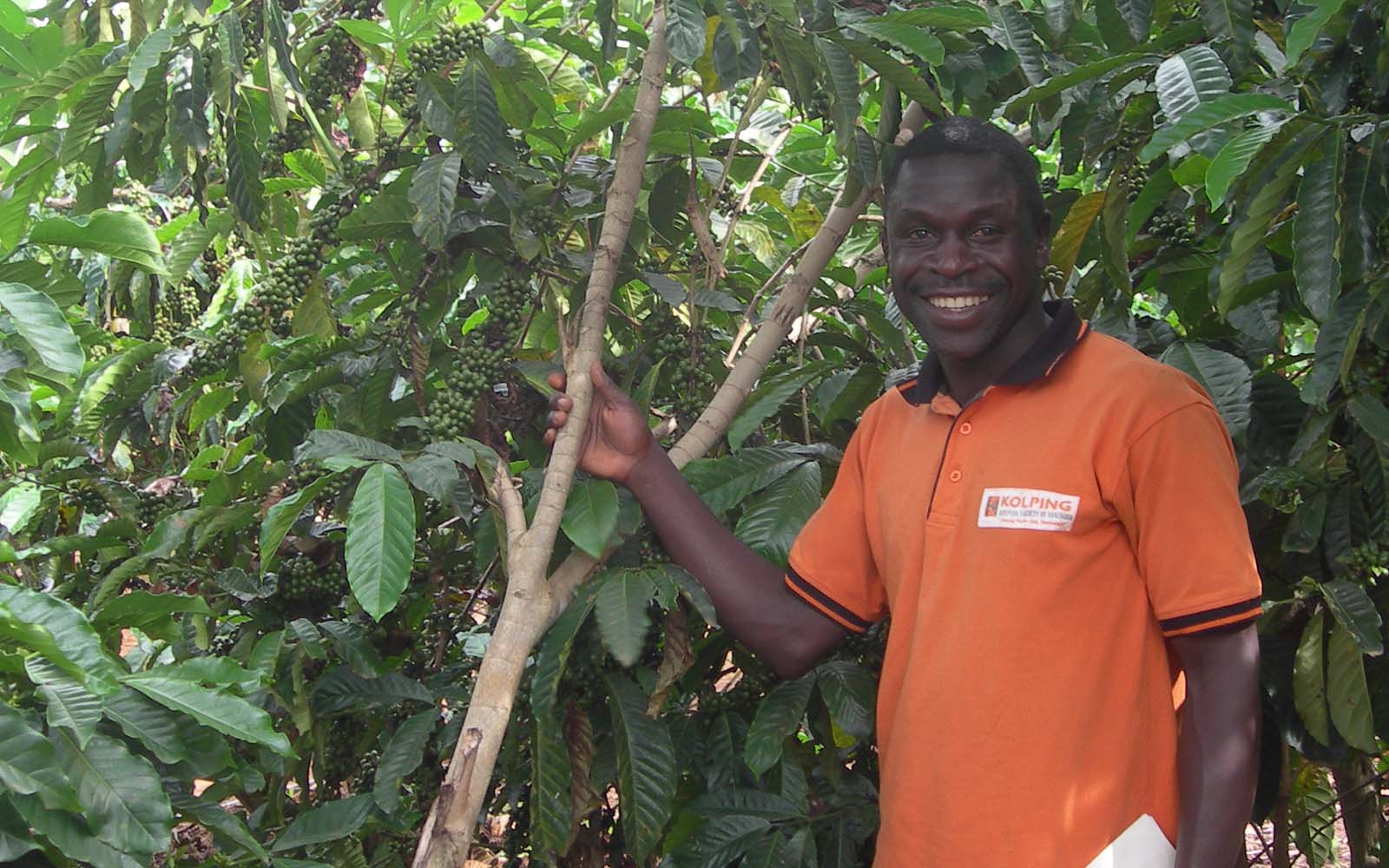Village life invigorated by successful coffee strategy
Story

(Above photo: Richard Simoni, operational leader of the Nyamuhunga Village Coffee Farmers’ Association, Tanzania, with a robust coffee bush.)
Over the course of a decade, Tanzanian farmers have reshaped life for their families through a sustainable and profitable coffee business.
In the village of Nyamuhunga, in northwestern Tanzania, farming families have generally lived off as little as $1/day, often struggling to feed and provide the necessities of life to their children and other family members.
Jamie Kyles, a Canadian volunteer who has spent many months in the region beginning in 2008, says the situation was so dire that, at one point, an elderly woman asked him to take her granddaughter, desperate as she was for the girl to escape a life of extreme poverty.
But, fast-forward to the present, and life has changed immensely for hundreds of farming families in Nyamuhunga – after they, with support from Cuso International and the Kolping Society of Tanzania, transformed their coffee operations into a profitable and sustainable business.
“Their success has been astonishing,” says Jamie, who helped to implement the coffee strategy over several placements in Tanzania. “In the village of Nyamuhunga (near Bukoba), 270 farming families have been positively impacted by the project’s success. Since economic stresses have reduced, violence against women has decreased, more children are in school, nutrition levels have improved, and people can afford the health care and medicine they need.”
While the project was implemented in northwestern Tanzania, Jamie says the plan originated while he was on a Cuso International placement in Uganda in 2007, when he worked alongside the East African Fine Coffees Association (EAFCA), now known as AFCA, on a strategy to help smallholder farmers in that country.
“This was an intensive learning experience. I spent four months picking the brains of all the leading coffee experts in Kampala and Nairobi (Kenya),” says Jamie, who had spent his career as an engineer at Shell Canada. In Uganda, he prepared a strategic proposal for AFCA to implement.

Volunteer Jamie Kyles, wearing a hat he had made for farmer trainers and team members involved in the project.
In the end, AFCA did not use Jamie’s proposal, but he carried it with him on his next Cuso International volunteer placement in 2008 in Tanzania, where he again used his business expertise to complete corporate evaluations of eight NGOs in the northwestern region, including the Kolping Society of Tanzania.
“It was while evaluating the Kolping Society, whose mission includes working to improve food security and the lives of subsistence farmers in northwestern Tanzania, that I had a lightbulb moment – that Kolping was the organization that could implement the coffee strategy,” Jamie explains.
Around Bukoba, smallholder farmers regularly intercrop coffee with their food plantings, but coffee-related agronomic skills had been lost over time due to complex historical and political circumstances. As a result, the coffee business vastly underperformed its potential, Jamie explains. He saw the opportunity to work with the Kolping Society and Nyamuhunga farmers to create a profitable and sustainable village coffee business.
Jamie went back to Tanzania with Cuso International to work with the Kolping Society and in 2010-11, they implemented the project – “a full value chain project, from basic agronomic practices to international marketing of the products,” he says. “By 2012, it was fully operational – with all the benefits going to the farmers. In 2019, farmers started selling to international markets, and with yields increased by 300 per cent, income was up 500 per cent.”
Jamie credits several factors for the success of the project, namely a stable and high-quality NGO partner (Kolping Society) that was trusted by local farmers, village leadership that took ownership of the project, and business and technical expertise, from himself and agronomists working with the Kolping Society.
“Among the farmers, there are so many great ideas, but they have limited business skills. I saw ways to make projects sustainable in the long-term,” says Jamie, adding that it took many years to convince farmers to sell their coffee to international markets, because selling internationally often meant a delay in payment, which they could not afford. With a plan in place, they became more comfortable with the risk, a decision that yielded impressive results.
For Jamie, the volunteer work he has been able to do in Tanzania has “profoundly changed” his post-career life (he retired young, at age 50, from Shell) and has led to many other opportunities, including work with the United Nations in several sub-Saharan countries. He also now volunteers with the Harbourside Rotary Club in Victoria, British Columbia, and they are on track to implement a second coffee-farming project near Bukoba, Tanzania, in 2022. He has also supported four orphaned children in Nyamuhunga through school.
“I have developed a few new branches in my life … it has been immensely rewarding,” says Jamie. “Because of the work of Cuso International and its partners, hundreds of Tanzanian families have improved their lives. It is incredible.”